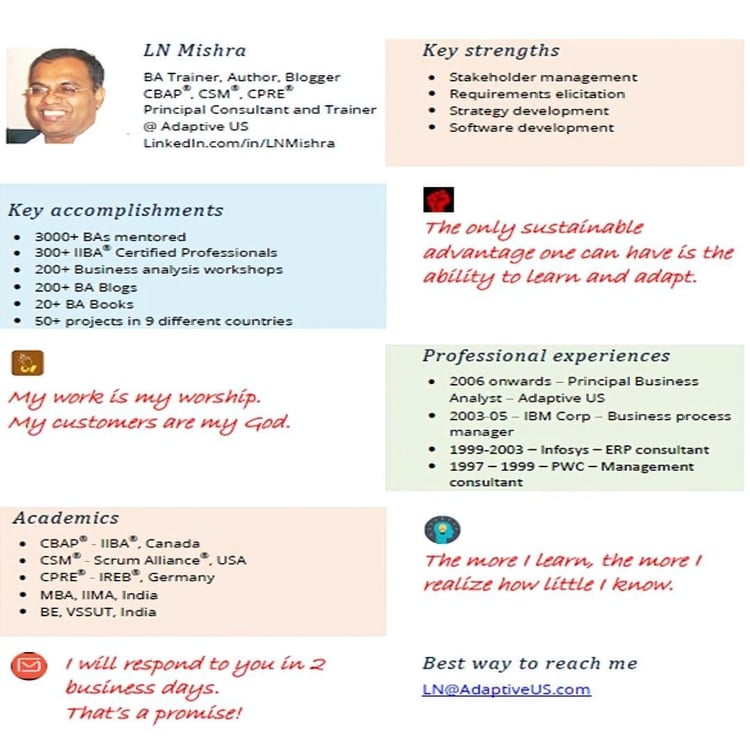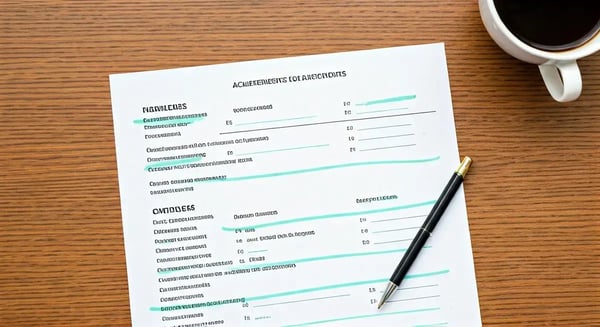Business analysts : How to make your CV stand out?
Key Highlights
- The role of a business analyst is to act as a bridge between technical solutions and business goals, using key skills like data analysis and stakeholder management.
- A strong business analyst resume should showcase technical skills, soft skills, relevant certifications, and career achievements.
- Tailoring your CV to each job description while optimising it for applicant tracking systems (ATS) boosts visibility and hiring chances.
- Highlighting quantifiable achievements, such as process improvements or cost reductions, makes your CV impactful.
- Include essential elements like education, work history, communication skills, and actionable insights to attract hiring managers.
Introduction
A business analyst helps a company work better by looking at complex data and giving helpful ideas for updates. This person can help to fix processes or make people involved in the company happier. The job needs you to be good at project management, talking to others, and using analytical skills. Business analysis is not the same as only using data analytics. It mixes technical smarts with knowing how the business runs. If you want to get noticed by new employers or move up in your job, you need to have the right skills. This is true when you write a CV to start or grow your career in business analysis.
Understanding the Role of a Business Analyst

Business analysts help a company work better, make more money, and grow strong. They look for problems in the business and work out what the company needs to fix these problems. Then, they help match those needs to new tools or changes, like IT updates or better ways to do things.
A business analyst does more than just look at numbers. They help set the company’s main goals and the plans to get there.
A business analyst is not where you only work with data. Business analysts need to be good leaders. They should know how companies run and how to handle money. To do well in this job, a person must mix real, useful ideas with smart advice. Business analysts work with lots of people, like those in technical teams and top leaders. They make sure everyone works together with their eyes on making more profit. Often, they give actionable insights that guide a company in making decisions.

Key Responsibilities in Business Analysis
Business analysts work in changing environments and take on many tasks. They start by gathering and looking at business needs to make sure these match up with key goals and plans. They use Power BI and Tableau to turn complex data into easy-to-understand steps that business people can use.
In project management, business analysts help set clear goals and watch over project timelines. They might lead teams from different areas during Agile sprints or work with others to decide which tasks are most important. When they make daily work steps better, it boosts customer satisfaction and helps save money.
Stakeholder management is an important part of what they do. Business analysts may talk through different needs or share updates to different groups. They are the link between the tech side and business leaders. Good communication skills help them bring people together and keep everyone in line with the main goals.
Essential Skills for a Successful Business Analyst
To do well as a business analyst in the IT business sector, you have to bring together technical skills, communication skills, and good analytical skills. In this job, you often need to know how to use things like SQL, machine learning, and tools like Tableau so you can look at data. You also stand out from others when you be good at data visualization and coming up with actionable insights using things like predictive analytics.
You also need to have strong communication skills. Business analysts spend a lot of time talking and working with different people, trying to understand what everyone wants, and showing why their ideas are good. This could happen in person, over presentation slides, or in meetings with people connected to the project. Clear and simple communication helps everyone work as one and makes sure things get done well.
You must also use analytical skills to understand tough data, spot trends, and find ways to meet the business needs. You need to be good at thinking clearly, solving problems, and making suggestions that match both your career goals and what the team has to get done. That is how you help the business move forward and make smart changes.
Preparing Your Business Analyst CV

When you write a business analyst CV, you need to be clear and to the point. Show your skills and what you have done in your work. Start with a short summary at the top. This part lets hiring managers know about your main skills and helps set the tone for the rest of your CV.
Make sure your CV shows your business analysis experience, your certificates, and your transferable skills, such as project management and how well you communicate. It is good to fit your resume to what the job wants. Use relevant keywords to help with applicant tracking systems. This will help your CV get noticed by both people and computers.
Gathering Necessary Documents and References
Your business analyst resume needs to have the right documents and good references. Start by getting your academic records and any relevant certifications like CBAP or PMI-PBA. These certifications can show that you are good at process improvement and that you want to keep learning.
You should also have professional references to help your CV stand out. Contact past managers or mentors. Try to pick people who know about your skills in stakeholder management or project delivery. Their feedback can give more trust to your business analyst resume. This helps show your soft skills and how you solve problems.
Stay organized to make a good impression. Check all your documents and certifications. Make sure they match the story of your professional development and show what you have learned. When writing your business analyst resume, talk about what you have done well. This will show your transferable skills, your business analyst skills, and what you know about the industry.
Identifying Key Career Achievements and Skills
Showing what you have done is important when you want to prove you can do the business analyst role. Try to point out things you can measure, like raising customer satisfaction or cutting down on user acceptance testing, which reduces how much the company spends to run every day. Talk about the specific projects you worked on that fit with your career goals.
Your skills should match the needs of your dream job. Add the technical and soft skills that are important, such as data visualization, stakeholder management, and time management. Employers want to see that you have given them actionable insights and real results they can measure.
Make sure to match each achievement with the words in the job descriptions. Maybe you worked out some complex data problems, changed the way things get done, or helped teams work together better. These examples will show your real skills for the business analyst position. Companies want to know you have the practical experience to do the work.
Crafting a Standout Business Analyst Resume: A Beginner’s Guide

A strong business analyst resume helps you stand out from others. It should show your real achievements and the value you bring. Start by making clear sections for your work history, your education, and all your relevant certifications.
Use a format that is easy for resume scanners to read. Make sure skills and experience are easy to find. The resume summary on your business analyst resume needs to catch hiring managers' attention right away. In the skills section, show your technical skills and your soft skills. Keep all parts of your business analyst resume short but filled with good details. Focus on your business analysis achievements.
Tools and Resources Needed to Get Started
Starting with the right tools is important for being quick and effective when you build your resume. Use professional resume-building sites made to show your technical skills and make your experience section match what the industry wants.
Data analysis tools like Power BI and Tableau help with data analysis. They also let you highlight your skills and show your projects in your CV. You can add certifications in machine learning to make your technical skills section stand out even more.
Also, use templates made for business analyst resumes. Platforms like Jobscan help you set up your CV so it works well with ATS algorithms. They also give smart, actionable insights, which will help you during your job search.
This guide gives you a strong start and helps you make a good resume. Next, we will look at each step in the process.
Step-by-step Guide/Process
Creating a good CV takes a few clear steps. First, pick a format that lets your main skills stand out. This might be a timeline style or a style that focuses on your main abilities. The right choice can depend on what you want to show from your past work. Next, write a short professional summary that tells hiring managers about your business analysis skills and what you hope to do in this field. When you talk about your work experience, be clear. Mention the projects and results that fit what the job needs. Add your education and any certifications to help prove you are a good match. Make sure your skills section is easy to read. List both your technical abilities and your soft skills. It is important to adjust every CV to each job so you can make a strong impression.
Step 1: Selecting the Right CV Format
Choosing the right CV format is important when you want to show your business analyst skills and experience. A chronological format puts your work history first, so it is a good choice if you have been in business analysis for some time. If you are a recent graduate or if you come from a different job, a functional format helps you show your relevant skills. A hybrid format gives both your experience and skills a balanced look. Match your CV style with the job requirements to get noticed by hiring managers and to get through applicant tracking systems. This will help you look good when you apply and give you a better chance with your CV.
Step 2: Writing an Engaging Professional Summary
Writing a strong professional summary is very important to get a hiring manager's attention. In this part, you should quickly show your years of experience, your relevant skills, and what you have achieved at work. Talk about your analytical skills and what you know about project management and data analysis tools. You need to use industry terms and relevant keywords to fit a business analyst role. This helps your summary work well with applicant tracking systems. When you talk about how your background meets business needs and what is expected, you make a good first impression that shows why you fit the job.
Step 3: Detailing Your Work Experience Clearly
Clearly showing your work experience is very important if you want your CV to stand out in the business analyst field. List your jobs starting with your most recent job and then go backward. Focus on the positions that matter most to a business analyst role.
- Use bullet points to point out what you did and what you achieved in each job. Say what you were responsible for.
- Show how you used your analytical skills and your knowledge of business processes.
Try to use business analyst keywords, relevant keywords, and other industry terms. These help your CV get found by applicant tracking systems. It is also a good idea to include real numbers or examples. Talk about things like lowering operational costs or making stakeholders happier. This helps show people what you can do in the business analyst role.
Step 4: Outlining Education and Certifications
A good education section shows that you have what it takes for the business analyst role. Start by listing your degrees, including information systems, with the latest one first. Add your major and name the school you went to. You should include any relevant certifications, like Certified Business Analysis Professional (CBAP) or something from the International Institute of Business Analysis. These show your commitment to professional development and prove you have key skills in things like data analysis and project management. Use relevant keywords, such as business analyst, business analysis, and certified business analysis professional, so applicant tracking systems spot your qualifications right away. This helps hiring managers notice you and what you can do.
Step 5: Listing Relevant Skills and Technologies
Clearly showing the most important skills and technologies can really help your business analyst resume get noticed. You need to focus on both technical skills, like being able to use data analysis tools such as Power BI and working with machine learning programs, and soft skills, like stakeholder management and good communication.
Make sure to highlight relevant skills that match the job description, so they stand out to hiring managers. Using bullet points makes your skills section easy to read and helps applicant tracking systems see your qualifications. Change your skills section to show how you can offer actionable insights and help improve business processes for the specific job.
Tailoring Your CV to Fit the Business Analyst Role

To get a business analyst role, you need to make your CV fit the job. Start by looking at the job description. Read it well. Find and use the right keywords and phrases that match what you have done, including those related to market research. This step will help you show you know the business needs. It will also help your CV get through applicant tracking systems.
Next, point out the key skills that are needed for this job. Be sure to mention your data analysis skills, your use of data analysis tools, your communication skills, and how you handle stakeholder management. This approach is good because it makes hiring managers see that you are right for the business analyst role. Showing you have these job requirements can give you a better shot at moving forward.
Analyzing the Job Description Thoroughly
To make a good business analyst resume, start by reading the job description closely. Focus on the key skills and specific things hiring managers want for the business analyst position. Look for the technical skills, industry terms, and any relevant certifications that are part of your resume. Match your past work and what you know to the job requirements you see. Your business analyst resume should let hiring managers see right away how your background fits with their business needs. When you show that you can do what is needed, you help yourself stand out and look ready for the business analyst job.
Aligning Your Skills with Job Requirements
When you write a CV for a business analyst job, you need to show how you fit the job description. Start by finding the key skills needed for the business analyst role. Some important ones are data analysis, stakeholder management, and process improvement. Use bullet points to show how your past work and technical skills match what the company wants. Put in industry terms and any relevant certifications you have. This will help show that you are ready to handle business processes well. It is important to make it clear how your skills match the job's needs. This way, hiring managers can see you are right for the job.
Advanced Techniques for Enhancing Your Business Analyst CV

Enhancing your business analyst CV means using some advanced techniques to get noticed by hiring managers. First, it is important to add relevant keywords and phrases all through your CV. This is because applicant tracking systems use these keywords when they look at resumes.
You should show your impact by using measurable achievements. This will help you catch people’s attention and let them see your ability to give actionable insights. For example, talk about how you helped lower operational costs or improved customer satisfaction. Show what you did on specific projects where your analytical skills made a real difference. Doing this will make you stand out more for the business analyst position.
Integrating Keywords and Phrases from the Industry
Including industry keywords is key to making your business analyst resume stand out. Use words that are in the job description, like stakeholder management, data analysis, and process improvement. This way, your resume is more likely to make it past applicant tracking systems. It also shows that you know about the field and the work. Add your relevant skills and any important technical terms to your CV, so people can see you are fit for the job. Change how you write to match the exact requirements and words that hiring managers ask for in the job description. This will help you get noticed and get closer to your dream job as a business analyst.
Demonstrating Impact with Quantifiable Achievements
Highlighting what you have done by showing the numbers can really help your business analyst resume. It is good to talk about specific projects where you helped make things better, like making work faster or lowering how much things cost to run. You should share real numbers to show your analytical skills. For example, you can talk about how you improved customer satisfaction by a certain percent or made project times shorter. Hiring managers want to see that you know how to share the exact value you brought to your work with real proof. This shows you can handle project management and stakeholder management well. Using this kind of proof will not only make your CV better but also fits with what most in the industry want, so your application stands out more. This is one of the best practices for a business analyst.
Avoiding Common Mistakes in Business Analyst CVs

There are some common mistakes that can keep a good business analyst CV from standing out. One problem is not showing your soft skills, like good communication and time management. If you do not mention these, people will not see how you work with others or handle your time. Also, if you just use a basic resume and do not change it for the specific job you want, your CV may not seem fit for that job and you might lose out. It is good to use the right industry terms and relevant keywords for the business analyst job. Try to use clear words when talking about your experience section. If you use strong bullet points and share clear results or numbers, your CV can get more attention from hiring managers and stand out from others.
The Importance of Including Soft Skills
Showing soft skills on a business analyst resume is very important. These skills show that you can work well with other people and talk clearly in a team. When you list things like stakeholder management or time management, you let hiring managers know that you can help with talks, close the gap between teams, and make customer satisfaction better. Talking about how well you can change and solve problems is also a good way to get noticed by hiring managers. It can help your business analyst resume stand out. This shows that you are ready for the fast-changing needs in business analysis.
Customizing Your CV for Each Application
Changing your CV for each job application can help show your qualifications in the best way. Try to match your skills and experience with what the job description is asking for. You can use the same words and phrases that hiring managers use in the details about the business analyst role. This can help your CV move smoothly through applicant tracking systems. It is also helpful to highlight some of your transferable skills and the things you have done well in your work history. Show how these things could meet the job requirements of the specific job. Focusing on these areas will make you stand out when applying for business analyst jobs.
Utilizing Technology to Upgrade Your CV
Using technology can help you make a better business analyst resume. There are tools that help you format your resume and pick the right keywords. This lets your resume match what applicant tracking systems look for, and hiring managers can find it more easily.
If you use data analysis tools like Power BI, you can show your skills by putting your results into charts. This helps show the kind of work you can do as a business analyst.
Resume platforms have templates that make it easy to point out your work experience and your technical skills. These tools help make your CV simple to read and nice to look at.
Making sure you know about these new technologies is good for your business analysis career. It not only makes your business analyst resume stronger, but it also shows you want to learn and grow in your job.
Tools and Software for CV Enhancement
Using the right tools and software can make your business analyst resume much better. Tools like Canva or Zety help you design your CV so it looks clean and well-made. This makes it easier for hiring managers to notice your business analysis skills. If you use formats that work with applicant tracking systems, your CV will follow industry rules. This can help your resume get seen more during online checks.
You can also use LinkedIn to enhance your LinkedIn profile. It offers templates that show off your relevant skills and top business analyst accomplishments. When you use these resources, you will create a good business analyst resume that helps you stand out from other people in the job market. This way, you can get more interest from hiring managers and move up in your career.
Efficient Use of Resume Building Platforms
Using resume building platforms can be a great help when you want to make your business analyst resume better. These platforms have templates that help you show off your key skills and your work history. They let you add resume examples and industry terms and keywords from the job description, so your resume matches what hiring managers and applicant tracking systems are looking for. You can quickly change your resume for each specific job, so you can highlight your relevant certifications and any work achievements with real numbers. This way, your resume will fit business needs and help you stand out in the job market.
Building Your Network as a Business Analyst

Building a strong network of people is very important for a business analyst who wants to move up in their job. If you talk with industry leaders at a conference, webinar, or workshop, you can get insights into market changes and learn the best ways to work. LinkedIn is a good place for business analysts to network. There, you can link with other people and show the work you do in business analysis. When you take part in group talks or join forums with others in your field, you become more well-known. You could also find someone to help and guide you, which is good for learning and growing on the job. Taking these steps can help you handle changes in business analyst jobs and do well.
Strategies for Professional Networking
Building a strong professional network is key if you are a business analyst who wants to move up in your career. Go to industry conferences and workshops. This helps you meet possible partners and industry leaders. It can also make people notice you more. Use websites like LinkedIn to share what you know and to talk with others who are also in the business analysis field. Join local professional groups or find forums online. These groups can help you meet people who might have job openings to offer. Take an active part in discussions. You can share your ideas, ask questions, and get advice. This is a good way to learn more, and it helps you build connections that can match your career goals.
Importance of Continuous Education and Certifications
Continuous education and certifications are important for any business analyst. They help you to build your knowledge and show others that you are serious about your work. By joining workshops and taking new courses, you can keep up with changing rules in business analysis. This lets you stay strong in a tough job market. Getting certifications, like the Certified Business Analysis Professional (CBAP), shows that you understand key skills and know the best practices for the field. Many companies want their business analysts to care about professional development. It shows that you can solve problems and think clearly. If you invest time in learning and getting better at your job, you become ready to grow in your career and move up faster.
Getting Expert Feedback on Your Business Analyst CV
Making your business analyst CV stand out is important. It can help a lot to get someone else to look at it. If you ask industry experts to review your CV, they may spot things you did not see. Their feedback can show you ways to make your skills section and work history better for each specific job. This way, your resume fits what the job requirements call for.
Getting a mentor who works in business analysis is also a good idea. A mentor can help you improve your CV. They will also help you understand what is needed in the industry and what people expect. These steps are important if you want to reach your career goals.
Seeking Reviews from Industry Professionals
Getting feedback from industry professionals can do a lot for your business analyst resume. Talking with people who have more experience helps you get real tips that make your resume more clear and useful. They can spot areas in your work experience or skills section that you might not see.
Try to use sites like LinkedIn to reach out to skilled business analysts. Ask them to look over your business analyst resume. They can help you know what is happening in the industry right now and what trends there are. Working with others like this makes your resume better and builds your network at the same time. This puts you in a good spot when looking for new jobs.
Benefits of Mentorship in CV Refinement
Mentorship can be a big help when you work on your CV. When you talk to someone with lots of experience, you get to learn things that most people do not know. This can help you make your business analyst resume better and clearer. It is good because you get to make sure your key skills match what companies look for. A mentor will give advice that is just for you and help make your story stronger. You will know how to show your best achievements on your business analyst resume.
Mentors also help you to understand what relevant certifications are needed. They teach you the small things about job applications that can be easy to miss. Because of this, you will have a better chance in the job market. Meeting with a mentor will also help you grow as a person. In the end, this puts you on the right path to get your dream job.
Conclusion
In the end, a good business analyst CV tells your story. It shows the relevant skills and experience you have for the specific job. Using industry words helps your CV stand out to hiring managers. It also makes sure applicant tracking systems pick up your CV. You should add numbers to show what you did in your last jobs. Make sure to highlight both hard and soft skills, so people see your impact. Always match your CV to each job’s requirements. This method will help turn your CV into a strong tool, giving you a better chance to get your dream job.
Frequently Asked Questions
How long should my business analyst CV be?
Your business analyst CV should be about one or two pages. It is good to keep the information short and to the point. Make sure every part is important and matches what the job is looking for. Change the length of your CV to fit your own experience and what the job needs. It is better to have good, clear sections than to fill it with too many words.
Is a cover letter necessary for a business analyst application?
A cover letter can be good for people applying to be a business analyst. It gives you a way to talk more about your skills and what you have done in the past. You can point out the things you have done that matter most for this job. The cover letter also lets you show that you are excited for the job. This can help you stand out to hiring managers.
What are the top skills to highlight on a business analyst CV?
To do well as a business analyst, you need to show that you are good at data analysis, solving problems, and talking with others in a clear way. It helps to be good at project management tools, too. You should also know how to work with stakeholders and have skills in using the right software. These things will help you fit the job and meet what the industry looks for.
How should I address employment gaps in my CV?
Talk about any employment gaps in an honest and smart way. Say why you had the gap, but keep it short. Point out any relevant skills you got during that time. Show how you kept learning, earned certificates, or achieved goals. This lets people see that you are serious about growing in your career and learning new things.
Final Tips for Aspiring Business Analysts
To do well as a business analyst, you need to keep learning and meet new people. Go to industry events. Look for someone who can guide you. Keep up with new tools and ways to do the job. Change your CV to fit each job you want. Also, do not be afraid to ask for feedback, so that you can make your applications better.
Staying Updated with Industry Trends
To stay ahead as a business analyst, keep up with the latest in your field. Read industry blogs, go to webinars, and be active in professional groups. You can also get many new ideas by signing up for newsletters and joining forums. This will help you know what is new and useful for your work. It helps you do your job well and keep your skills sharp as a business analyst.
Preparing for Interviews
To get ready for a business analyst interview, start by looking up the company and learning about its culture. Practice the questions they often ask a business analyst. Think about your answers so you can show your skills and what you have done in the past. You should also come up with some questions to ask them. This shows you are interested and really want to be part of their team.
Emphasizing Continuous Learning and Adaptability
Putting focus on always learning and being ready to change is very important for business analysts. This shows they care about growing in their work. When they keep up with what is new in the industry and with new technologies, they can stay ahead in their field. This helps them meet business needs quickly as things change. It also makes them even more valuable at work.
Visual and Content Consistency in Your CV
Keeping your CV consistent in look and content is key if you want a professional image. Use the same font, colors, and layout from start to end. Make each section clear and easy to spot. This helps people who read it to follow along and see what you be good at. Recruiters will find it easier to read and understand your qualifications.
What key skills should a business analyst highlight on their CV?
Business analysts should highlight key skills such as critical thinking, data analysis, project management, and effective communication on their CV. Additionally, showcasing proficiency in tools like SQL or Excel can enhance their appeal to potential employers, demonstrating their capability to drive business improvements through data-driven insights.
You can download much more useful BA training, question banks, templates at SuXeed
Product Owner vs. Business Analyst
Everything You Wanted To Know About Business Analyst Profession
You May Also Like
These Related Stories

Crafting the Perfect Resume for Aspiring Business Analysts

20 Business Analyst Resume Tips for Your Dream Job



No Comments Yet
Let us know what you think